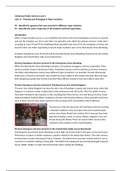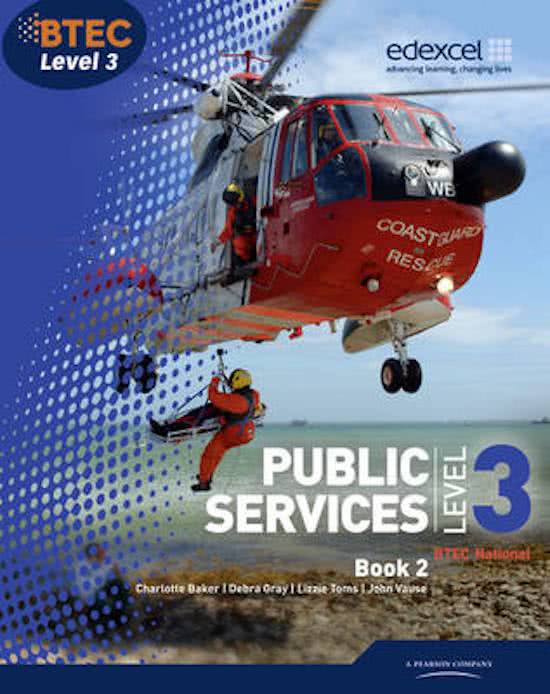Uniformed Public Services Level 3
Unit 15 - Planning and Managing of Major Incidents
P4 - Identify the agencies that were involved in different major incidents
P5 - Describe the work of agencies at UK incidents and their legal duties
Introduction
When a major incident occurs, it can sometimes be hard for the normal emergency services to respond
and sort the situation out, this is why there are specialist units within the primary services. In this task, I
am going to cover P4 and P5 by identifying these specialist units from all of the emergency services and
describe their role when responding to recent major incidents such as the Manchester Arena Bombing.
Incidents included to cover P4 and P5 will be the Manchester Arena Bombing, Floods across the United
Kingdom and Armed Police raids across Manchester.
Primary Emergency Services Involved in the Manchester Arena Bombing
When the Manchester Arena Bombing took place, the primary emergency services responded. These
services include Greater Manchester Police, Ambulance Service and Fire and Rescue Service. However,
the Police and Ambulance Service have different types of workers. For example, Greater Manchester
Police have a Firearms Command, who would have been called to this incident because they may have
been dangerous people that normal unarmed Police Officers wouldn’t have been able to deal with.
Primary Emergency Services Involved in Flooding Across the United Kingdom
This year, the United Kingdom has been hit with a lot of flooding in coastal and central areas, when this
happens; it is always a major incident due to the seriousness and risk to life. All of the public services
have been involved in the response to this, including the Police Service, Fire and Rescue Service, Royal
National Lifeboat Institute (RNLI), Ambulance Service and Mountain Rescue. Many specialist units from
each of these services have been involved in the rescuing of the many British citizens affected.
The picture on the left shows the Fire and Rescue Service working
in flooded conditions, they have been the most involved public
service since these floods have started; this is because they have
specialist training in order to rescue citizens trapped in cars and
houses during the floods. There are several other services also
involved in the response to the recent flooding.
Primary Emergency Services Involved in the Armed Police Raids across Manchester
Following the Manchester Arena Bombing, several high risk Armed Police raids were carried out across
Manchester in hopes to detain suspicious suspects related to the attack days before. The main services
involved were Greater Manchester Police. However, the British Army was also involved which is not as
common for incidents relating to the public. The British Army deployed several United Kingdom Special
Forces (UKSF) soldiers to assist the Armed Police when raiding the buildings.
, Greater Manchester Police (Manchester Arena Bombing)
Police Officers in the United Kingdom are called to pretty much every major incident in the United
Kingdom; this is because they are trained to do a lot of things to keep the public safe. Every Police
Service in Britain has specialist units that will all bring something different to the table when responding
to a major incident. For this, I am going to describe how different specialist units in the Police Service
worked when responding to the Manchester Arena Bombing and what role they had to complete.
During the response to the Manchester Arena Bombing, there were many parts of Greater Manchester
Police involved and a wide array of units which all had specific roles to keep the public safe;
Firearms Command: was the first unit to respond to this incident, Armed Police entered the arena and
started to pull out and evacuate casualties, they also had to sweep the whole building to ensure there
was no further danger or explosions. Most of the Specialist Firearms Officers (SFOs) that responded are
trained in first aid and could start to work on the many casualties of the attack.
The picture on the left shows an SFO on scene after the
attack. This Officer is equipped with a rifle and lots of
other gear which will help them if they come face-to-
face with a dangerous suspect. Normal Police Officers
were not able to do this as they are not specially trained
or given permission to enter the arena until it was clear.
Dog Unit: also arrived on scene shortly after the attack happened, the Armed Police had already swept
the arena for suicide bombers and attackers but the Police dogs were needed to locate any potential
bombs planted around the arena, this process had to be done quickly in case there were any bombs as
further explosions would have made the incident even more catastrophic.
Pictured on the left, a Police Dog Handler can be seen searching
around the arena for any suspicious items which could be bombs.
They are specially trained to communicate with the sniffer dogs to
locate a range of explosive devices. The dog will be searching for
smells of chemicals and metals which may be used in the crafting
of bombs. This is a great addition to the Police response.
Roads Policing Unit and Air Operations: these two units would have worked together during the
response to this attack. It was their role to monitor and control traffic around the city. This would
include things like creating emergency vehicle access routes, road closures and the stopping of
suspicious vehicles which could cause further danger. This is great because the Police now had eyes on
the road and in the sky meaning that any further attacks would have been stopped. Specialist Police
Drivers and Helicopter Pilots were deployed in order to fulfill these tasks and keep the public safe.





